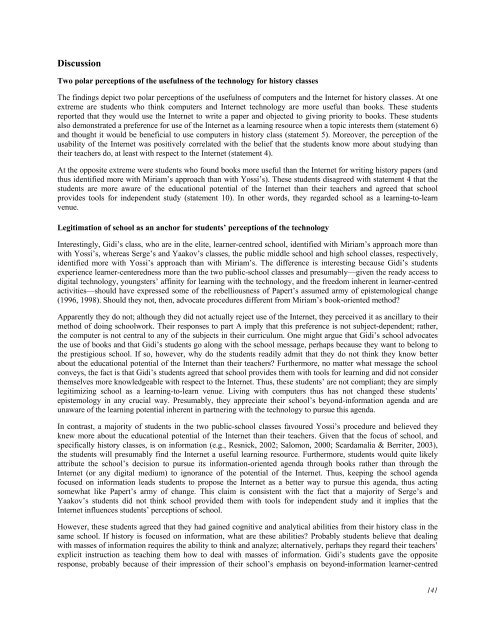Download - Educational Technology & Society
Download - Educational Technology & Society
Download - Educational Technology & Society
Create successful ePaper yourself
Turn your PDF publications into a flip-book with our unique Google optimized e-Paper software.
Discussion<br />
Two polar perceptions of the usefulness of the technology for history classes<br />
The findings depict two polar perceptions of the usefulness of computers and the Internet for history classes. At one<br />
extreme are students who think computers and Internet technology are more useful than books. These students<br />
reported that they would use the Internet to write a paper and objected to giving priority to books. These students<br />
also demonstrated a preference for use of the Internet as a learning resource when a topic interests them (statement 6)<br />
and thought it would be beneficial to use computers in history class (statement 5). Moreover, the perception of the<br />
usability of the Internet was positively correlated with the belief that the students know more about studying than<br />
their teachers do, at least with respect to the Internet (statement 4).<br />
At the opposite extreme were students who found books more useful than the Internet for writing history papers (and<br />
thus identified more with Miriam’s approach than with Yossi’s). These students disagreed with statement 4 that the<br />
students are more aware of the educational potential of the Internet than their teachers and agreed that school<br />
provides tools for independent study (statement 10). In other words, they regarded school as a learning-to-learn<br />
venue.<br />
Legitimation of school as an anchor for students’ perceptions of the technology<br />
Interestingly, Gidi’s class, who are in the elite, learner-centred school, identified with Miriam’s approach more than<br />
with Yossi’s, whereas Serge’s and Yaakov’s classes, the public middle school and high school classes, respectively,<br />
identified more with Yossi’s approach than with Miriam’s. The difference is interesting because Gidi’s students<br />
experience learner-centeredness more than the two public-school classes and presumably—given the ready access to<br />
digital technology, youngsters’ affinity for learning with the technology, and the freedom inherent in learner-centred<br />
activities—should have expressed some of the rebelliousness of Papert’s assumed army of epistemological change<br />
(1996, 1998). Should they not, then, advocate procedures different from Miriam’s book-oriented method?<br />
Apparently they do not; although they did not actually reject use of the Internet, they perceived it as ancillary to their<br />
method of doing schoolwork. Their responses to part A imply that this preference is not subject-dependent; rather,<br />
the computer is not central to any of the subjects in their curriculum. One might argue that Gidi’s school advocates<br />
the use of books and that Gidi’s students go along with the school message, perhaps because they want to belong to<br />
the prestigious school. If so, however, why do the students readily admit that they do not think they know better<br />
about the educational potential of the Internet than their teachers? Furthermore, no matter what message the school<br />
conveys, the fact is that Gidi’s students agreed that school provides them with tools for learning and did not consider<br />
themselves more knowledgeable with respect to the Internet. Thus, these students’ are not compliant; they are simply<br />
legitimizing school as a learning-to-learn venue. Living with computers thus has not changed these students’<br />
epistemology in any crucial way. Presumably, they appreciate their school’s beyond-information agenda and are<br />
unaware of the learning potential inherent in partnering with the technology to pursue this agenda.<br />
In contrast, a majority of students in the two public-school classes favoured Yossi’s procedure and believed they<br />
knew more about the educational potential of the Internet than their teachers. Given that the focus of school, and<br />
specifically history classes, is on information (e.g., Resnick, 2002; Salomon, 2000; Scardamalia & Berriter, 2003),<br />
the students will presumably find the Internet a useful learning resource. Furthermore, students would quite likely<br />
attribute the school’s decision to pursue its information-oriented agenda through books rather than through the<br />
Internet (or any digital medium) to ignorance of the potential of the Internet. Thus, keeping the school agenda<br />
focused on information leads students to propose the Internet as a better way to pursue this agenda, thus acting<br />
somewhat like Papert’s army of change. This claim is consistent with the fact that a majority of Serge’s and<br />
Yaakov’s students did not think school provided them with tools for independent study and it implies that the<br />
Internet influences students’ perceptions of school.<br />
However, these students agreed that they had gained cognitive and analytical abilities from their history class in the<br />
same school. If history is focused on information, what are these abilities? Probably students believe that dealing<br />
with masses of information requires the ability to think and analyze; alternatively, perhaps they regard their teachers’<br />
explicit instruction as teaching them how to deal with masses of information. Gidi’s students gave the opposite<br />
response, probably because of their impression of their school’s emphasis on beyond-information learner-centred<br />
141
















